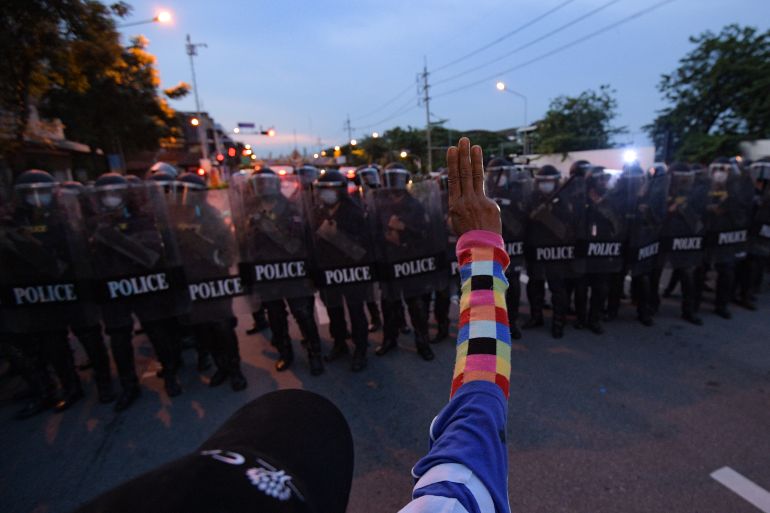In Bangkok, Thai police are brutalising child protesters
The Thai government needs to radically rethink its approach to ongoing protests in the country.

As Thailand’s youth-led protests gather momentum after strict COVID-19 lockdowns muzzled the freedom to peacefully assemble for months, newspaper coverage of recent rallies has focused overwhelmingly on clashes between protesters and police, portraying the demonstrations as a battleground with petrol bombs and fireworks unleashed on one side, and repeated use of tear gas, water cannon and rubber bullets on the other.
These media reports, however, unfairly depict the mostly peaceful demonstrations and distract attention from the consistently brutal treatment of child protesters by the Thai police.
Keep reading
list of 4 itemsAustralian students join protests for Palestine
Are US campus protests against Israel’s war on Gaza going global?
With eyes on US college campuses, students stress: ‘Gaza is why we’re here’
Many students assembling at Bangkok’s Din Daeng intersection – a key site of recent protests – are in their early teens, with some as young as 11. Some have lost parents to COVID-19 and have dropped out of school or work as they struggle to cope. Yet authorities continue to violently lash out against student protesters and others criticising their handling of the COVID-19 pandemic or pushing for reforms online.
A year after youth-led protests flooded the streets of Bangkok – yellow rubber ducks, school uniforms and Harry Potter costumes appeared in mass demonstrations calling for social reform – the situation has turned increasingly ominous over the last few months, with record numbers of peaceful student leaders being detained, beaten by police and denied bail. Authorities continue to detain children, including without judicial review.
Since the start of the protests last year, at least 226 children are among hundreds of people facing prosecution for peacefully protesting and expressing their opinions. The authorities are taking legal action against more than 1,458 people, including 111 charged with sedition and an all-time high of 145 charged with royal defamation – crimes that bring jail terms of up to 15 years. In rare cases, protesters face up to life imprisonment.
I observed these protests myself and witnessed the excessive and indiscriminate use of force. I saw water cannon blasted not only at demonstrators but at passing pedestrians. I felt tear gas burning my eyes as police tried to strike fear into protesters. When night falls, explosive sounds split the air as fully equipped police rain rubber bullets onto protesters – as if attacking an enemy. These scenes play out in near-silence from the international community. The Thai authorities’ violations of their international human rights obligations must be condemned.
Videos that went viral on social media showed police firing rubber bullets at protesters at close range or beating them with batons. Another clip showed a police officer kicking a restrained man in the face. On at least one occasion, live rounds were used at the Din Daeng intersection, leaving one protester in a coma. The police have denied using live rounds.
The authorities are increasingly willing to trample on human rights to silence peaceful dissent. They are also refusing to offer meaningful dialogue to try and understand why people are protesting. And with children among those caught up in this tide of repression, there is an urgent need for Thai authorities to take concrete and meaningful measures to prohibit and punish the use of excessive force when dispersing protests.
The authorities have tried to justify their use of excessive force to disperse recent protests by citing the need to enforce emergency restrictions to stem the spread of COVID-19. Yet in August, Thailand’s Civil Court blocked the government’s attempt to use emergency powers to introduce internet bans and threaten to imprison anyone caught sharing criticism of the state’s handling of the pandemic online. The court also called on police to exercise restraint when using crowd control devices such as tear gas and rubber bullets, but nothing changed.
Just a few days ago, Amnesty International Thailand spoke to a 16-year-old being charged at a juvenile court in Bangkok. He said a police officer struck his head with a pistol after arresting him for taking part in protests on October 6. The officer then tried to break his finger and burned cigarettes into his left hand.
Over the last few months, 10 peaceful student protest leaders have been detained after being arrested a second time for their involvement in demonstrations, and repeatedly denied bail. Amnesty International has voiced fears for the safety of detainees – the majority of whom are now being held in a quarantine prison.
When accused of intensifying their repression of those peacefully exercising their human rights, Thai authorities say the police tactics comply with international human rights law. Their increasingly brutal treatment of peaceful student protesters, however, reveals a different reality.
As the government gradually lifts the country’s strictest virus prevention protocols, it needs to radically rethink its approach to ongoing protests in the country. With public anger rising over the government’s handling of the pandemic, its crackdown on demonstrations and a grim economic outlook, frustrated protesters will continue to exercise their right to freedom of peaceful assembly on the streets. Their voices deserve to be heard.
The Thai authorities can remedy the situation by immediately dropping all unwarranted charges against peaceful protesters, regulating police use of force to comply with international standards, allowing people the right to freely express their opinions without fear, and ceasing their relentless assault on child protesters. It is absolutely imperative that other governments encourage them to do so.
The views expressed in this article are the author’s own and do not necessarily reflect Al Jazeera’s editorial stance.
